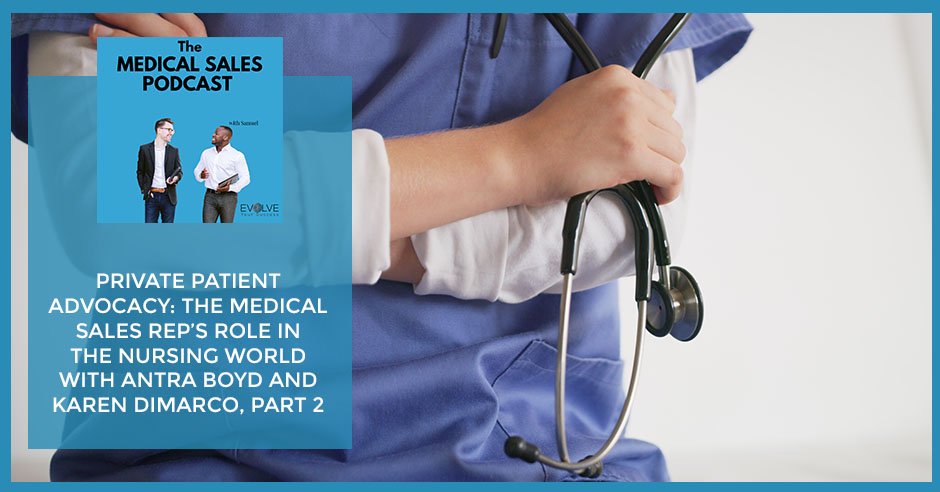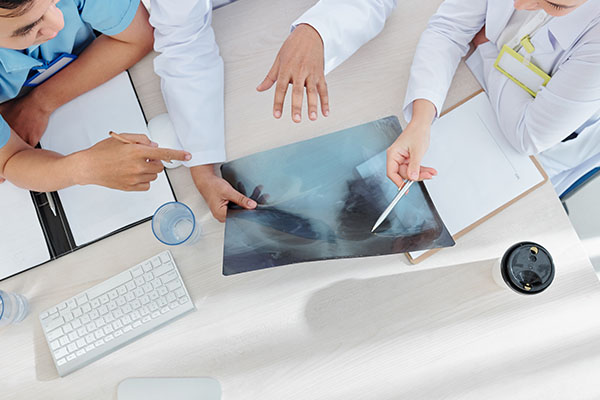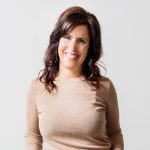
In part two of our interview with Antra Boyd and Karen DiMarco, we get more of their perspective of the medical sales industry, specifically the role they believe a medical sales rep plays and its importance to their role as nurses. Antra and Karen started a company and have a podcast where they speak about patient advocacy, impacting how nurses receive an education.
To listen to the first part, check it out at The Medical Sales Podcast.
—
Listen to the podcast here
Private Patient Advocacy: The Medical Sales Rep’s Role In The Nursing World With Antra Boyd And Karen DiMarco, Part 2
We have part two with nurses Karen DiMarco and Antra Boyd. They started a company and they also have a podcast where they speak about patient advocacy. They are impacting the way nurses receive an education. In the rest of this interview in part two, we get into their perspective of the medical sales industry, what role they believe a medical sales rep plays and how it is important to their role as nurses, what they are doing with the company, and how they came to create everything they have created for nurse education and impacting patient outcomes. It is an episode you want to read. As always, thank you for reading. I hope you enjoy the rest of this interview.
—
There is a medical device pharmaceutical rep to get to know the nurses. It does not matter what area a nurse works in. If they can get in and develop relationships, there is an influence there.
Let’s talk about that for a second because you made a good point. An example was pharmaceuticals. It is up to that rep to figure out how to get that person or nurse’s time. Think back to when you were busy, making things happen, and a rep tried to stop you from get your time. What do you want to hear from that rep that would even allow you to consider, “Let me stop and give them a couple of minutes.” What approach would you be most receptive to? This is completely subjective, but I am curious to know.
When you show up as yourself and you are you, and you are doing your thing, people know it. You do not even have to say it. It is presence like, “I want to be here. I am interested in good outcomes.” It is showing up and being yourself. Sales can be pushy. You know when they are trying to push a drug and white-knuckling it. It is like, “Do I have to as a nurse?” The ones that I love are the ones that show up. They are themselves. They are personable and real. I know it.
Authenticity is what you are looking for.
There are no Academy Awards for nurses. We need such little encouragement. It goes so long. We are so thirsty for support and encouragement. If you want to get in good with a nurse, take fifteen seconds, watch them, tell them, and acknowledge them, “I came in here because I wanted to talk to you. I see you are too busy. I want to acknowledge that.”
They will give you the 60 seconds you do not have. It has to come. It can’t be blowing smoke because they will smell it like a mouse fart a mile away. We can’t be inauthentic. They have got refined bullshit detectors. If you truly take some of your time to give it to someone else and watch another human being in the weeds, I would not want to be you. I came here to try to sell you something. I am not going to tell you anything. That sells.
That is a segue to the next question I wanted to ask. I do not think people truly understand the influence nurses have when it comes to the provider’s choices. Can you speak a little bit about what that looks like? You spoke to the OR and you said, “Medical reps do not do enough. They do not realize how important it is to establish a relationship with the nurses.” Tell us why and what kind of influence you have in the whole process?
The influence we have is better patient outcomes. Let’s do that again as an example since we have been on that track. When a physician decides to use a robotic machine, that is not part of my decision-making process and the OR manager. You ask the hospital administrators to figure out the financial aspects of that side of it. We are after quality patient outcomes. If research demonstrates that this is a device that is going to improve outcomes, then that is what we are after.
We want the best outcomes for our patients. If you work with us collaboratively, we are a team, and you teach us what you know, that is a huge piece of it. Nurses should have more influence from start to finish in terms of what we are purchasing. We had an OR redesign at my hospital and there were no nurses at the table. They built the boom where all the technology sits right in front of the bed. You could not get a gurney in there. I would have been like, “That is not going there because that is bad for patient outcomes.”
You need to get a patient to an ICU because they are doing poorly and you got to maneuver around this technology boom. We should have more influence. In the nursing world, we are starting to see that nurses are the change. We are going to be the change for healthcare because we are the boots on the ground and so are you. To me, it is all about good patient outcomes. Nurses should have more influence than they do when it comes to that higher level. What devices are being used? What drugs are we using? We are the boots on the ground.
To me, if a medical or pharmaceutical rep wants to have influence or even sell and get in front of nurses to educate, go for the ones that are outside of the system like us. Greater National Advocates or GNA, for instance, is a whole conglomerate of patient advocates. If you want to educate patient advocates so that they can help their clients make fully informed decisions, that is a great way to have that influence. The advocate, when they are helping their client make fully informed decisions, is going to say, “This hospital has this kind and this is what I learned about this kind. This office or rep prescribed this drug and this is what I want you to know about this drug.”

Patient Advocacy: If a medical or pharmaceutical rep wants to have influence or even sell and get in front of nurses to educate, go for those outside of the system.
You make the decision but now it is fully informed. We have got Trisha Torrey’s group and Greater National Advocates. Make a phone call and say, “I would like to tell you so when you are with a client who has this issue, you know what to look for and what hospital and doctor to go to.” Find the nurses who have already spit themselves out of the system because within the system, they are going to help but they are not going to have the influence they do if they are outside. That is what we are trying to change.
Let’s talk about that for a second. We understand what you do as far as being patient advocates but how are you going to change the influence the nurses in the system have from where you are?
Through the work that we are doing now, the company, and the podcast, we are the megaphones for the people who are creating those changes. The education we provide is also different. We are patient advocates, so we are telling nurses in communities how to advocate for themselves. That is going to be that grassroots or ground-up percolation of change. We had a couple of nurses on our podcast who created the anti-magnet hospital thing. We are a magnet hospital. Two nurses do not mean much.
Let’s get some context because a lot of people reading might not understand what that is. First of all, you have a podcast that educates nurses. It sounds like you are saying that as you continue to disseminate information to that podcast, it is going to increase the belief that a nurse has in the system to do differently and impact a bigger change. Tell us some of these definitions. What is a magnet hospital? What is the issue you have seen with magnet hospitals?
As far as I understand, and it is not a fully informed understanding, magnet hospitals have to have a certain amount of their staff and nurses to be degreed. We could go on about what that means, if it means anything. They have to have a certain percentage of credentialed specialty with the CCRN in critical care. They have to have those specialty things. Once they achieve that or if they are on their way to achieving it, they pay a couple of $10,000, $45,000, to $50,000.
This is not research. This is what I remember hearing from someone else. They get to stamp their magnet hospital. It is polished. It does not have a whole lot of substance, at least from my personal experience. I have worked at magnet hospitals and small community hospitals. You are only as good as your lowest common denominator. You could have that stamp but it is lipstick on a pig to me. It is a hierarchical thing. We are a magnet hospital. It is window dressing, but there are nurses going, “We are going to make a real credential.”
They are creating this groundswell of these apps where nurses can report their satisfaction with working there and how much they feel supported by the administration. The safest hospitals are the ones where the nurses feel they love to work because they feel safe working there. They feel that they are supported either by staff ratios or team spirit. They are getting educated and improved. These nurses that we have interviewed are making apps where nurses can report that thing.
Let’s say it is the Grapefruit app. They are creating all this data in Grapefruit of where the nurses want to go and work and what the conditions are working. Instead of wanting to be a magnet hospital, they want it to be a Grapefruit hospital because that is going to help them attract and retain their staff, which is going to increase their employee satisfaction, patient safety, and patient satisfaction. It is going to be ground up instead of lipstick on a pig thing.
If you are a patient, you can go to that app and see where nurses’ greatest satisfaction is in terms of where they work and be like, “I do not want to go to Hospital B because those nurses are unhappy. I would rather go to Hospital A because their staffing ratios are good,” or whatever those metrics are. This is to reinforce what Karen is saying. This is because nurses are creating this. This is not being created by some high-in-the-sky organization, administrators, or the health care system. These are boots-on-the-ground nurses who are doing this. This is why this matters.
One thing I want to address is COVID. The big elephant in the room seems to come down a little bit. We have been allowed to walk freely and not wear our masks all day long. Everything is being addressed. It was difficult for medical sales professionals to get access to healthcare administrators, nurses, and doctors because of COVID. Over that time, a lot of medical organizations said, “It is nice not to have reps coming in. Maybe we should keep it this way.” If you have seen this from your side, please speak to it. What could you say? Now that things are being led up again, how should medical sales professionals approach their accounts?
Why would they say that it is nice?
Nurses are so thirsty for support and encouragement. If you want to get in good with a nurse, take fifteen seconds, watch them, tell them, and acknowledge them. That sells. Share on XAs you know, when you were in the field, you would get a lot of reps coming to see you. Sometimes, it can be an interruption to an account, how they are operating, and what they are doing. Maybe it is not so much in medical devices. In medical devices, it was more of safety, but in pharma, that can be an interruption to have another sales rep that as a competing product try to get more of the providers’ or the accounts’ time. When COVID happened and there was no access, some providers preferred it. They said, “When we come out of this thing, we might want to keep it this way.” There is still value that sales professionals can bring. From a nurse’s perspective, what should a medical sales professional keep in mind to make sure that value is understood?
We already touched on it with authenticity. Honestly, I can’t think of anything else better than that because people know. If you are coming from, “I got to make my numbers and sell,” there will not be time for that. The relationship is important. I have some good friends who are medical sales reps because they are real and authentic. They have all of these qualities that are attractive and fun to be around. To me, that is the most important thing. I am like, “I would have my hip done with a Mako machine.” It is because of that.
It is Sales 101. I am preaching to the choir. That is why I asked the question, “Why did not they want them around?” It is because they felt that they were selling them something, but people wanted to be seen. If that is what you are doing, they will you around. My first and best lesson in sales was from my brother. My family has a wholesale produce distribution company. My brother has innovated all the fresh-cut fruit and vegetables you see in the grocery stores.
He was doing that in 1994. He has created some of the machines that have automated that stuff. This was Northern Ohio in Cleveland. He sent me to Erie, Pennsylvania, when he first started selling the fresh-cut fruit trays. He sent his little sister out to the grocery stores in Pennsylvania so that the customers would know that this was coming to the grocery so that they would ask the grocery store. I would go and stand in grocery stores with this tray of fresh-cut fruit and go, “Do you want fruit?”
I am selling and bothering them. I finally was like, “Screw this. I suck at this.” I would sit there and I like people. I have a genuine curiosity about people. I forgot the fruit. I am like, “I love your hat. Where did you get that hat?” They are in the produce section. You see people genuinely. It takes five seconds to see them. They are coming over and talking to me like, “What are you selling?” I am like, “My brother started this thing. He is trying hard.” She is like, “I will take one.”
Ask yourself the question, why don’t they want you there, and do something about that. It is because you are taking up the limited time that they have, but if you are giving them their time by seeing them and acknowledging their hard work, that is where you go in. Also, acknowledge that you are providing information. How is this office, hospital, or unit going to innovate, grow, and advance unless they are trying on new information, innovations, and things? You have value to give them.
That goes for the providers too. It is doing that for the providers because I do not think many providers get an Academy Award either. They are tired and burned out. If a pharmaceutical rep comes to a doctor’s office and they are like, “It was so nice in COVID not to have all these people here,” be interested, notice them, and pay attention. What value do you bring? To me, that is everything.
I live in California and she lives in Oregon. We both had private patient advocacy businesses but we did different things. I was more on education, community, and stuff like that. Antra was working with a thriving one-to-one business, but we have been friends. We met going through a patient advocacy program. She is my sister from another mister. We knew we would do something together. My nursing license had expired. I was procrastinating as 99% of nurses do to get those 30 CEs every two years because the education is antiquated and the delivery mechanisms suck. They wait until the last minute because we are learning all the time on the job anyway.
Tell them what is CE.
It is Continuing Education credit. You need 30 of them.
That is exactly what CME credit is for physicians.
To cut to the chase, I listen to podcasts all the time and ask myself. I get so much value out of listening to podcasts, especially if it is medical health-related. It makes me a better practitioner and teacher. It also improves my life but it is not available. You can watch all the YouTube videos and listen to all the podcasts and audiobooks you want but they are not CE credits. We decided that is stupid. We got our CE providership creative podcast. Our job is to interview amazing, interesting, and fascinating people that we would want to learn from. It is worth a CE for a nurse but that is where it started because we want to make education in itself.

Patient Advocacy: Nursing education needs an overhaul. The professors, teachers, and people out there educating do want to do a good job, but the system is so backward and not helpful.
The thing is that typically, in the world of Continuing Education for nurses, it is so boring. It is the worst ever. It has been for years. Poke your eyes out. That is why nurses wait until the very last minute because it sucks. To Karen’s point, why are we not getting CEs for stuff we are already doing that is upleveling us and making us better nurses and people? Can we please get some interesting information out there? Do I have to be chained to a computer for five hours to get the CE?
Could I do it while I am mowing the lawn or taking my daughter to the airport? Could I listen to it? Why does the delivery method have to be so antiquated? That was a huge part of the motivation. Karen left her license at the last minute for renewal. She had to go and get 30 CEs. She found some interesting material that she had to sit in front of the computer for twelve hours to listen to. She is like, “I am not doing this anymore. This sucks.”
Is your company the sole business turning content into CE credits? Are patient advocacy and all those other things included within the umbrella of your company?
It is not a patient advocacy company but it is going to be an academy. There is a podcast. That is the one-hour CE credit you could get. We are also creating courses but in a fun vein that you can listen to on the go. They are quick twenty-minute modules. They are convenient but entertaining. We want you to snort-laugh when you are listening to our stuff. In the academy, there are longer programs.
We went through RNPA, Registered Nurse Patient Advocate. You learn about functional integrative medicine, systems biology, epigenetics, and nutrigenomics, not just keeping people safe in the medical system. It is how to reverse illness and that kind of stuff. We hope to be putting that certification program on the RNPA platform too.
It is doing education for nurses in a different way. From my personal experience, and I know Karen can speak to this as well, nursing education needs an overhaul. The professors, teachers, and people that are out there educating do want to do a good job as nurses and doctors do want to do a good job but the system is so backward and not helpful. Nurses who graduate with their Bachelor’s degrees go into the field and do not know anything. It is terrible.
There is a huge gap between what they learned in nursing school and being a nurse. Why is that? Why can we not get enough nurses through the doors? We won’t hire brand new nurses because they know nothing. We are interested in flipping that model and doing it differently. A lot of nurses are interested in that. We are part of a movement that is redesigning and rethinking the way we educate nurses. This is our little piece.
The education is just for nurses.
Anybody can listen to the podcast.
It is helpful. For example, we have a woman who owns a medical equipment company. She is a clinical nurse. She specializes in lymphedema. She is in Northeastern Ohio in Toledo. She told this story. Antra worked at an OR and I worked in ICU. I knew what lymphedema was but I never had to deal with it. I am listening to this, and I am like, “Why are we doing a podcast on lymphedema? I am game. I will learn. That is fascinating.” This woman told the story. I am like, “Why did you get into lymphedema?”
She tells the story of how her father had stomach cancer. His legs were so swollen that when he was getting confused the night before he died while he was in his La-Z-Boy chair, he grabbed a handle on the chair, the legs came down and burst open. He spent the last twelve hours of his life in excruciating pain because he died the next morning. We were both like, “That could happen.” We learned so much from this woman. A lot of doctors and nurses do not have that knowledge. We did not.
In the nursing world, we are starting to see that nurses will be the change for healthcare because they are the boots on the ground. Share on X“Mama has had her arms swelled up for the last five years and nobody knows what to do with it. They keep giving her Lasix.” That is because it is not edema. It is lymphedema. The public or a layperson listening to that podcast is going to go, “That is what it is.” They are going to educate their doctor about what it is and how to treat it by listening to this woman. That is another thing it does.
Your company provides training and resources to everyone with more specific training for nurses. Ladies, how can someone find the resources that your company provides?
Go to our website. If you are a nurse, you will be able to go on there. It is a subscription service. It is like Netflix. They have to pay a nominal monthly thing and then they can get unlimited CE by podcast. We have this cool new technology. A nurse can listen to the podcast with their phone and the app, press a button, speak into the phone to answer the activity question, and do the evaluation. The certificate gets shot out to their email. We store all of their CEs, not just the ones that get through the company.
It is also storing in the organization. We will feed, shelter, and water your CE certificates. When you need them, we have them. We have a Facebook group too. You do not have to have a subscription to be in the Facebook group. I am doing an educational event on March 30th, 2022 about the ultradian rhythm. You have to be a nurse to join the community. We will probably put that lecture on podcasts.
You can find our podcast on Spotify and Apple Podcasts if you are a layperson or not a nurse and you want to listen.
It is the purple snake wrapped around a microphone.
Anyone can listen to the podcast. To join the Facebook group, you need to be a nurse. Lastly, does your company turn other people’s content into CE credits?
It is coming soon. How brilliant is that? You are talking about collaboration, teams, and shining the light on other people and what they are doing. That, to me, is so exciting.
To be honest, the first podcast that gave me the idea was Joe Rogan. He had James Nestor. The guy wrote a book called Breath. I learned. It was fascinating. It was two hours in a podcast. I am relearning the anatomy and physiology of the nasal and the respiratory system. He goes into history. He has me under the catacombs in Paris comparing skulls and talking about tribes and different religions that used breath and all this stuff. I am like, “Why is that not CE?” If anybody is reading this, like you, Samuel has a podcast that they would like nurses to be able to get at CE credit for, too, find us.
Here is what’s funny about that book too. As a surgery nurse, I did not understand how detrimental sinus surgery could be. I did sinus surgery all the time. Our patients are fully informed if they do not understand the risks of removing the filtration system of our noses. It never even occurred to me that it would be something that I would want to know as a patient. Maybe I still decided to have surgery, which is perfectly fine, but I did not even know. James Nestor, who wrote this book on breathing because he was having breathing problems, educated me. In a clinical setting, I would educate my patients differently because of his book.
That is powerful stuff. That is inspiring. That will make you want to lead to the creation of all of the wonderful things you are doing out there. They can find you on Facebook and anyone can listen to the podcast. Nurses can subscribe. In the future, sooner than later, anyone with content will be able to turn that into CE credits.
If you want to reach out, I am Karen@RNegade.pro. If you are reading this, you have great content, and you think a nurse could get CE credit for it, reach out to us and give us an email.

Patient Advocacy: Nurses should reach out and use medical sales reps for the resource that they are because they know a lot.
Ladies, thank you so much for joining us. We had some fun. We got to talk a lot about what is going on. I would apply some medical sales professionals, the influence that you have as nurses, and the amazing things you two are doing with your company. We will be keeping tabs and looking out for more stuff. Thanks for the time.
You are welcome.
Thank you, Samuel. Thanks to your audience too.
Here is a quick nod to medical sales reps in general. I do not know if we covered this but in my experience, I have had some amazing people come in, be part of the team, and be good at what they do. They are so knowledgeable. I encourage nurses to also reach out and use them for the resource that they are because they know a lot.
Thank you, ladies.
—
That was Karen DiMarco and Antra Boyd. It is fantastic to see medical professionals when they leave the industry and transition into new innovative resources that changed lives. What they are doing for nursing education is groundbreaking. The way they are doing different things to impact patient outcomes is fantastic. As always, we try to bring you guests that have innovation, see things differently and are doing things to further healthcare, whether it be education, technology, or people skills.
We bring guests that are making a difference. Maybe you are reading these episodes and you are someone that wants to get into the medical sales industry, you are in a customer service role, a sales role, or a role that has nothing to do with medicine and sales. You are thinking to yourself, “How do I get into the medical sales industry?”
You have gotten a few interviews and you are not getting past the 1st or 2nd round or maybe you have applied to a few places and you have not heard back yet. It is time to stop wondering how you are going to get in and do something about it. You need to visit EvolveYourSuccess.com and select Attain a Medical Sales Role. Fill out the application, schedule time with someone from our staff, and have a conversation about how you can be in your next medical sales role.
If you are someone that is in the field or you are a medical sales representative, sales associate, or sales rep and you are thinking to yourself, “In 2022, I want to make a difference.” You got in a new role and you want to start with a bang and increase your numbers, or you have been in your position for a while and you are saying, “I am ready to do something different to get where I ultimately want to be,” then visit EvolveYourSuccess.com and select Improve Sales Performance.
Fill out the application, follow the prompts, have a conversation with someone from our staff, and learn how this can be your groundbreaking year. We are always going to do our best to bring you guests that are changing the scene in healthcare and provide resources that help change the scene for your careers. As always, thank you for reading. Make sure you tune in next time.
Important Links
- Karen DiMarco
- Antra Boyd
- RNegade.pro
- Greater National Advocates
- Trisha Torrey
- Mako
- Facebook Group – The RNegade Community
- Spotify – RNegade
- Apple Podcasts – RNegade
- Joe Rogan
- Breath
- Karen@RNegade.pro
- KarenDiMarco.com
- https://KarenDiMarco.as.me/exploration
About Antra Boyd

About Karen DiMarco

Love the show? Subscribe, rate, review, and share!
Join the Medical Sales Podcast Community today:
